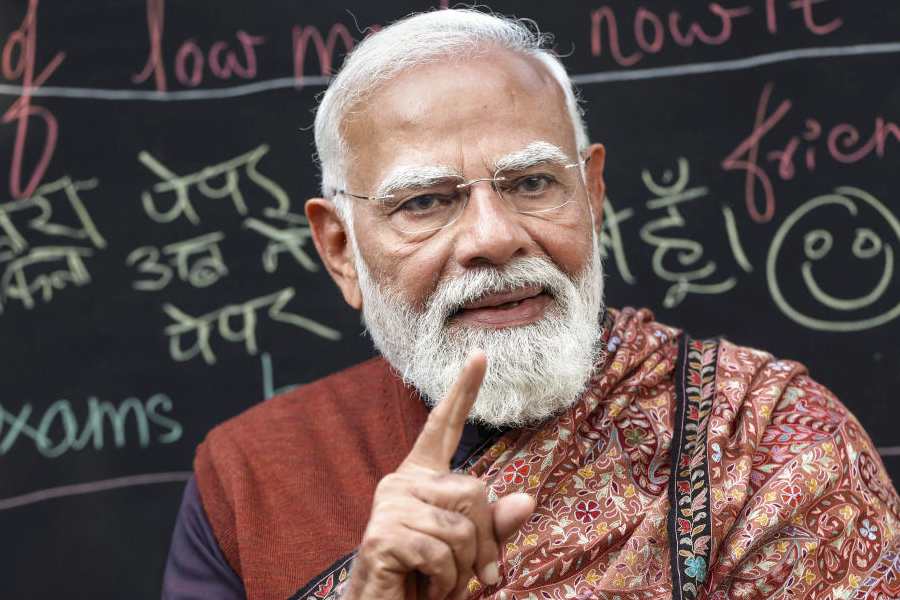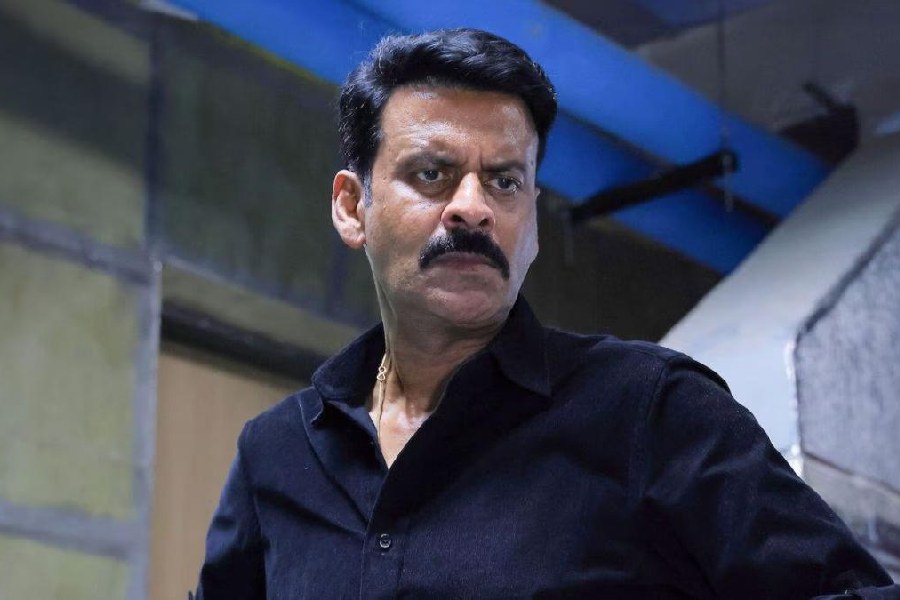DOCTOR WHO

• A mythologist, author, illustrator, columnist, professional speaker and management theorist. Tweets at @devduttmyth
• Has written more than 30 books on the relevance of mythology in modern times and in management
• Some of his bestselling titles are My Gita, Jaya: An Illustrated Retelling of the Mahabharata, Sita: An Illustrated Retelling of the Ramayana, Myth = Mithya: Decoding Hindu Mythology and Business Sutra: An Indian Approach to Management
• You’ve seen him on TV too. He has hosted two shows: Business Sutra on CNBC-TV18 and Devlok on Epic TV
• He is a doctor by education
• He illustrates his books himself
• His latest work is Olympus — An Indian Retelling of the Greek Myths (Penguin India, Rs 499). As Alexander the Great reaches India, he comes across a gymnosophist (a naked wise man). While Alexander wants to conquer the world and earn a place with the gods on Mount Olympus, the gymnosophist chooses to experience nothingness. Their conflicting world views make up the book
In 2010, he decoded ‘LSD’ as the three main currencies in the Indian tradition — Lakshmi (wealth), Saraswati (knowledge) and Durga (emotion). This October, he has turned to western mythology in his latest book, Olympus. With an ever-increasing fan base, thanks to his cool and contemporary retelling of mythological stories and decoding of rituals,
Devdutt Pattanaik is one of the most prolific and best-selling writers in India today. An email chat with t2 about why the world needs to get rid of its obsession with Objective Reality and what makes Indian mythology unique.

Olympus is about exploring the world of Greek myths through an Indian gaze... isn’t this something you started doing long back... at least from the days of your TV series Business Sutra, which began with Alexander and the gymnosophist? What took you so long to come up with this book?
Yes, I strongly believe that to appreciate Indian mythologies, we have to appreciate western mythologies, especially Greek and Abrahamic, to gain a better view. So I am reasonably familiar with other mythic traditions. This book was on the cards, but I wanted to do it after I had a substantial volume of work related to Indian mythology, which still remains poorly explored. Now, I guess, is the time. Though I decided to write this over three years ago... even earlier, I think.
In Olympus, you’ve again addressed the idea of India and Bharat. How much of Bharat do you think still exists in the India of today?
This divide between India and Bharat existed before as Nagara and Grama — the city and the village — in Sanskrit literature. Pupul Jayakar has written about it in her book, The Earthen Drum. There is an India of the city and India of the village and the two are different. Migrants bring Bharat into India, and take India into Bharat. Both nourish each other.
You keep talking about Subjective Reality and its importance in the Indian world view. Do you think we are focusing too much on Objective Reality and that’s where India needs to rethink?
Objective Reality is dehumanising monotheism, where truth lies outside the individual in measurements. This view of the world is classic Abrahamic, which seeks commandments for a tribe from a supernatural force — God. Science also locates truth in measurement, which is independent of human gaze. In fact, human gaze is seen as bias or prejudice, almost a pollutant in the sciences. This way of thinking works very well with material sciences but not with social sciences where human imagination plays a key role, where political and economic views of the world are but opinions and theories, and not truth. There is nothing objective about capitalism or communism; they are just different ways by which the world is explained.
I feel this obsession with Objective Reality is a veneer used to hide the truth of human psychology, the animal instincts to dominate and be territorial. Subjectivity is what makes us human. Rejecting it has made the global village a place where technology is more valued than people. Hence the quest for robots and artificial intelligence, which are more ‘objective’ hence better than any people. This trend is dangerous. India has always rejected this view and it’s time the global village learns this, as the threat of WW3 — or is it WW4? — looms large.

Do you think Greek mythology is less intricate and more linear than Indian mythology?
I don’t think western scholars will like to hear the idea that mythology of the beloved Greeks is less intricate. But it is linear. This is why modern discourse is also linear, our yearning for creating a better world, our seeing the world as problem (chaos) that needs to be solved (order) in this one lifetime (before crossing Styx, the river which forms the boundary between earth and the underworld). Modern thought thus aligns well with the Greek mythic structure, but of course, we want to believe we are objective and rational.
Indian mythology is based on karma. Every moment is a fruit of seeds sown in the past and every moment we are sowing seeds for the future. Thus global terrorism is not a ‘problem’ in the Hindu world view, simply a fruit of seeds ‘we’ have sown in the past. This is not the way Europe and America think. They are too busy fighting the monster to see themselves as the mother of the monster.
Who is your most favourite Greek hero or mythical character? Is there any Indian counterpart?
I love the monsters of Greek mythology — Minotaur (half-bull and half-man), Medusa (woman with snakes for hair), Chimera (part-lion, goat and snake). They are killed by Greek heroes, or feared as the cause of pandemonium as in the case of Pan (half-human, half-goat).
In Indian mythology, we worship beings that are a combination of multiple animals. So we worship Narasimha (half-lion, half-bull) and Yali (part-lion and elephant) and the Nagas.
What is your Achilles’ heel?
Yearning for spicy potato chips!
What’s the most fascinating aspect of Indian mythology?
The core of Indian mythology is dharma. And dharma is related to the divide between humans and nature (prakriti). Dharma makes no sense unless you appreciate karma (concept of rebirth). That makes Indian mythology unique, for no one is born with a clean slate. We are born with baggage and we die with baggage that is carried forward to the next life.
Your Twitter bio reads: “Mythologist, Author, Illustrator, Columnist, Professional Speaker and Management Theorist”. Is it in that order?
Not quite. Mythologist is the overarching thought of all that I do. Writing, illustrating and lecturing are all simultaneous, though I became a professional speaker much after I became an author and columnist. Management theory came into my life much later. I realised that objective-based management is based on Greek and Abrahamic mythologies, and no one had commented on that. People have assumed it is universal. They still do. For we refuse to accept the diversity of cultural thoughts. We yearn for a homogeneity that does not exist in nature, or culture.

You are a doctor who turned into a mythologist. What was the turning point?
No turning point. I worked in the pharma and healthcare industry (was never a clinician) and mythology was a parallel stream of interest until I could afford to do it full-time, which happened only in 2008, when Kishore Biyani made me Chief Belief Officer of the Future Group, a think tank role that gave me ample opportunities to think, and come up with ideas such as ‘LSD’ or Lakshmi, Saraswati and Durga.
Then you made Business Sutra. Today you are a management theorist. What’s next?
My years as Chief Belief Officer enabled me to write the theory I call Business Sutra: where belief shapes behaviour, which shapes business. We believe that wealth has to be chased and grabbed from the market, hence we create battlegrounds (ranabhoomi). Instead, if we worked to attract wealth, the approach would be different, and we would create performance grounds like theatre stages (rangabhoomi).
Why do you write what you write?
I can see so very clearly in the stories and rituals and symbols of India the mythic patterns of India that are delightful, and want to share it with all. I am surprised that no one has done this before!
When you are dealing with mythology, you have to deal with gods, heroes and demons…. Are you a believer or an atheist?
You are using very western language where ‘believer’ is equated with religion, and God, and Jesus. We forget that human rights is a belief. Justice is a belief. Equality is a belief. None of these is Objective Reality. Property is an artificial construction, not a natural phenomena. Belief is the cornerstone of all cultures. Yet, belief is reduced to faith in Jesus or God of Abraham, assumed to be God of all religions. This lack of clarity is the source of global dissonance. Mythology is also about belief in the nation state, and borders, that create insiders and outsiders, and liminal beings. The Greeks used the words ‘gods’ and ‘heroes’. The Christians used the word ‘demons’. We are stuck with them.
Which mythologists do you like to read?
Many people retell mythology. Very few decode mythology. People often call both groups of people mythologists, though I prefer using the term for decoders, not retellers. Great decoders of mythology remain Claude Levi-Strauss, Sigmund Freud, Carl Jung, Joseph Campbell, Mircea Eliade, Heinrich Zimmer. I love the work of Lawrence Coupe from Manchester University.
The youth consists a big chunk of your fans. What do you think attracts young minds to the mythological topics you discuss?
I think they are seeking answers and have open minds, so are willing to listen to non-fossilised versions of ancient discourse.
Do you follow daily serials based on Indian mythology on Indian television today?
No, though I have consulted many of them. The visual vocabulary of Indian television is designed for an audience or market that does not consider the likes of me.
Sibendu Das
The importance of Devdutt Pattanaik is that he.... Tell t2@abp.in










